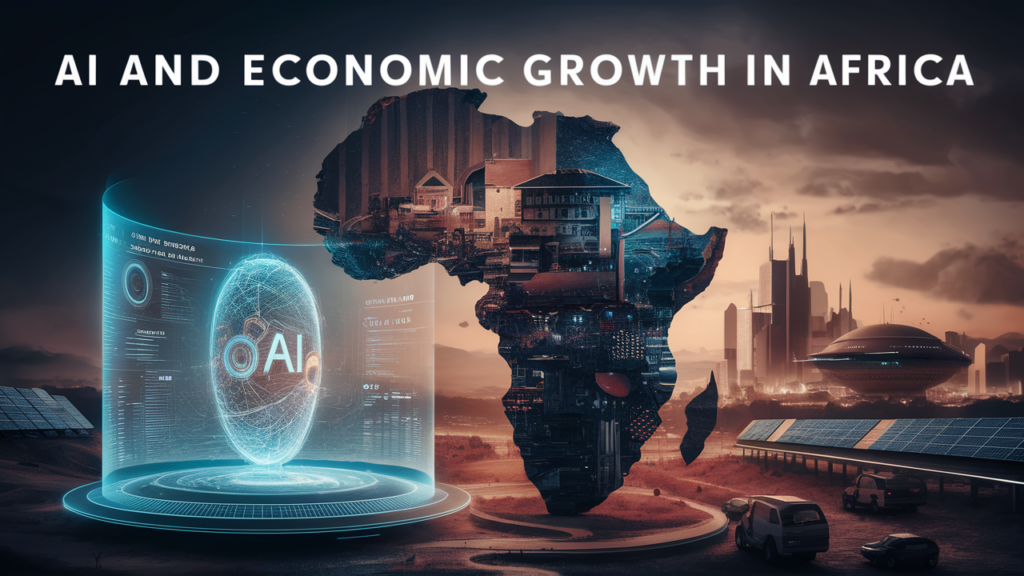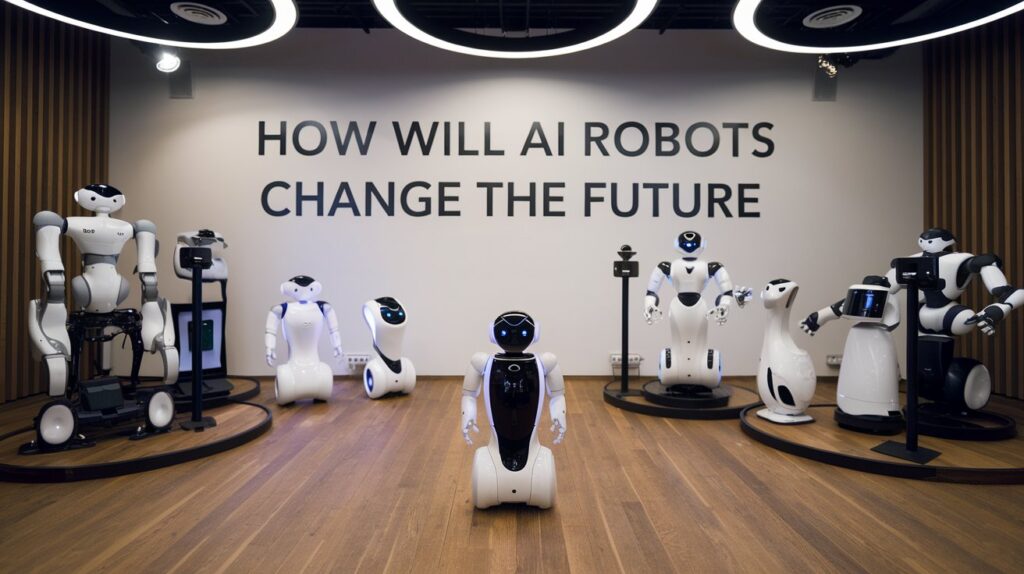AI and Economic Growth in Africa

The integration of artificial intelligence into Africa’s economic framework presents an unprecedented opportunity to accelerate growth across various sectors. With the potential to significantly elevate the continent’s GDP, AI technologies can transform agriculture, healthcare, and education. However, the journey to widespread AI adoption is fraught with challenges, including infrastructural deficiencies and skill gaps. Understanding the current state of AI in Africa and exploring strategic implementation methods are crucial steps toward realizing its full potential. What strategies could African nations employ to overcome these obstacles and fully harness the power of AI?
AI and Economic Growth in Africa audio file
Key Takeaways
- AI advancements could boost Africa’s GDP by up to $1.2 trillion by 2030.
- AI-driven sectors like agriculture and healthcare create jobs and diversify African economies.
- Improved operational efficiencies from AI enhance economic growth and quality of life.
- AI technologies address sustainable development goals and environmental conservation challenges.
- Investment in digital infrastructure and skill development is crucial for leveraging AI’s economic benefits.

Current State of AI in Africa
Amidst rapid technological adoption, Africa is experiencing a significant surge in the utilization of AI tools across various sectors, including education, government, and private enterprises. This trend is underpinned by substantial AI development initiatives and diverse use cases that are transforming the continent’s digital landscape.
A notable indicator of AI uptake is the daily usage of AI tools such as ChatGPT, with research revealing that 27% of Kenyans engage with the platform daily, ranking third globally. This highlights a growing familiarity and reliance on AI among African consumers.
Educational institutions like the University of Pretoria and Makerere University are at the forefront of AI development, boasting prominent AI labs that drive innovative research and applications. Furthermore, the African Institute for Mathematical Sciences has been instrumental in cultivating AI talent, graduating over 3000 students through its AI programs.
The involvement of tech giants like Microsoft, Google, and IBM underscores the continent’s potential in AI. These companies have established AI research labs in Africa, fostering a collaborative environment for local and international AI initiatives.
Collectively, these efforts reflect a robust groundwork for AI integration, driving significant advancements and unlocking new opportunities across the continent.
Key Sectors Benefiting From AI

Building on the solid groundwork of AI integration in Africa, key sectors such as healthcare, agriculture, education, and public safety are experiencing transformative benefits from AI technologies.
In the healthcare sector, AI technologies are pivotal in diagnosing diseases and facilitating telemedicine, which significantly improves healthcare outcomes for African populations. For instance, AI algorithms can analyze medical images to detect conditions like tuberculosis and malaria with high accuracy, alleviating the burden on healthcare professionals and improving early detection rates.
In agriculture, AI-driven innovations are optimizing resource management, enhancing crop yields, and ensuring food security. Precision farming techniques, powered by AI, enable farmers to monitor soil health, predict weather patterns, and manage water resources efficiently. This leads to increased productivity and sustainability in agricultural practices, which is crucial for a continent where agriculture employs a substantial proportion of the population.
Education is also being revolutionized through AI, offering personalized learning experiences and expanding access to educational resources. AI-powered platforms can tailor educational content to individual learning styles, thereby improving student engagement and outcomes.
Public safety in Africa benefits from AI-powered surveillance systems and predictive crime analysis, which bolster security measures and enhance community safety. These advancements collectively drive economic growth by improving quality of life and operational efficiencies across these critical sectors.

Challenges to AI Adoption
Despite the promising potential of AI in transforming various sectors across Africa, several significant challenges impede its widespread adoption on the continent. One of the primary AI adoption challenges is the limited infrastructure in remote areas, which restricts access to advanced technologies. High-speed internet and reliable electricity, essential for AI operations, are often scarce outside major urban centers.
Addressing digital literacy gaps is crucial for effective AI adoption. A significant portion of the African population lacks basic digital skills, making it difficult to utilize AI-driven solutions effectively. According to a 2021 survey, only 28% of Africans possess sufficient digital literacy, highlighting a critical barrier to AI integration.
Ethical considerations also play a pivotal role in the adoption of AI technologies. Issues such as data privacy and algorithm bias must be carefully managed to maintain public trust. The potential for AI to exacerbate existing social inequalities through biased algorithms is a pressing concern that requires vigilant oversight.
Furthermore, the high costs associated with AI implementation pose financial barriers for many organizations. The lack of skilled professionals in AI and data science further limits the potential impact of this technology, as there are insufficient experts to develop and maintain AI systems.
Addressing these challenges is essential for unlocking AI’s full potential in Africa.
Strategies for AI Implementation

To effectively implement AI in Africa, governments must establish regulatory frameworks and incentives that promote innovation while ensuring ethical standards. Policy development should prioritize data privacy, security, and transparency to foster trust among users and stakeholders. Economic growth can be driven by focusing AI strategies on Small Medium Scale Enterprises (SMEs), which are pivotal for job creation and economic diversification in the region.
A solid foundation for AI implementation includes reliable cloud infrastructure and consistent access to electricity, as these are critical for hosting AI data and applications. Additionally, democratizing access to data through enhanced collection and open data initiatives can empower citizens and stimulate AI-driven solutions.
| Key Strategy | Expected Outcome |
|---|---|
| Regulatory Frameworks | Ethical AI use and innovation |
| Incentivizing SMEs | Economic growth and job creation |
| Reliable Infrastructure | Efficient AI data and applications |
| Data Democratization | Empowered citizens and AI growth |
Future Prospects and Opportunities
The burgeoning potential of AI technologies in Africa presents a remarkable opportunity to significantly enhance the continent’s GDP by up to $1.2 trillion by 2030. This growth hinges on fostering a robust AI ecosystem that includes startups and entrepreneurs.
African countries can create jobs and diversify their economies by investing in AI-driven sectors such as agriculture, healthcare, and financial services. For instance, AI-powered agricultural technologies could optimize crop yields, thereby addressing food security issues and boosting agricultural productivity.
Moreover, leveraging AI for sustainable development goals and environmental conservation can address pressing socio-economic challenges. AI applications in resource management can help mitigate the effects of climate change, ensuring long-term environmental sustainability.
By bridging the digital divide through AI-enabled solutions, underserved communities can gain access to transformative technologies, improving education and healthcare outcomes.
Embracing AI as a tool for transformation and empowerment is crucial for unlocking Africa’s economic potential. To achieve this, policymakers must prioritize investments in digital infrastructure and skill development.
Frequently Asked Questions
How Will AI Affect the Economy in Africa?
AI will significantly impact Africa’s economy by driving job displacement, necessitating robust data privacy measures, and fostering skill development. This transformation promises both opportunities and challenges for sustainable economic growth across the continent.
How Does AI Increase Economic Growth?
AI increases economic growth through job automation, optimizing supply chains, and enhancing financial services. This leads to improved productivity, efficiency, and scalability, which drive GDP growth and market competitiveness in specific regions.
Can AI Lead to Economic Diversification in South Africa?
AI can significantly drive economic diversification in South Africa by leveraging job automation, data analytics, and Industry 4.0 technologies, thereby enhancing productivity, creating new industries, and reducing dependency on traditional economic sectors.
Which African Countries Are Using Ai?
Kenyan startups, Nigerian fintech, and Egyptian healthcare sectors are leading in AI adoption. Kenya, Nigeria, and South Africa have robust AI strategies, while Egypt is emerging in AI-driven healthcare solutions, promoting regional technological advancement.

Conclusion
The integration of AI in Africa holds substantial promise for economic growth. This potential is particularly evident in key sectors such as agriculture, healthcare, and education.
Despite existing challenges such as limited infrastructure and skills gaps, strategic investments and policy frameworks can drive AI adoption. By focusing on resource optimization, improved healthcare, and personalized education, African nations can significantly enhance GDP and achieve sustainable development.
Future prospects for AI in Africa hinge on collaborative efforts to overcome barriers and leverage AI for regional advancement.







Great to hear this for Africa, we are proud of Aitellit
Its a continent of hope, talent and possibilities <3
sure, we are still a virgin land despite the political instabilities